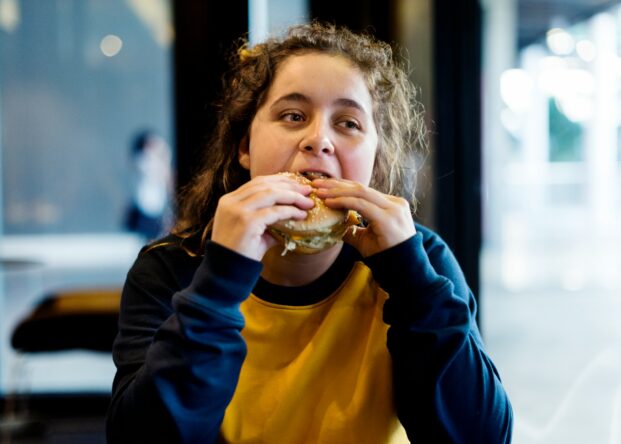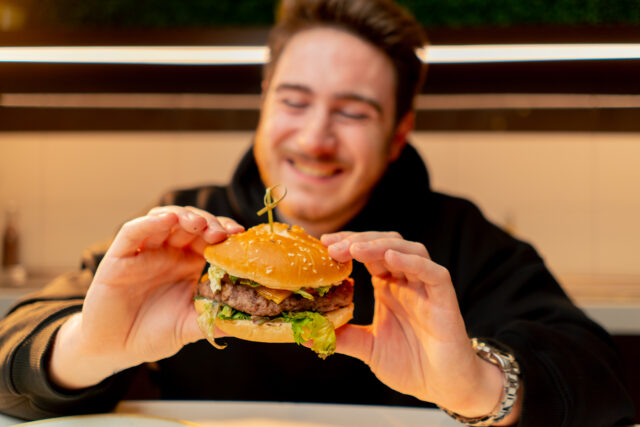Stress eating is something most of us have done at some point.

Whether it’s reaching for crisps after a tough day, inhaling a chocolate bar mid-work deadline, or ordering a takeaway just because everything feels overwhelming, food has a way of making things feel better — at least temporarily. However, emotional eating doesn’t have anything to do with willpower or bad habits, at least not really. There are real psychological and biological reasons why stress makes you crave comfort food. If you’ve ever wondered why you turn to food when life feels chaotic, here are some possible explanations. Obviously, everyone is different, but some of these things might stand out as relevant to you.
1. Your brain links food with comfort.

From childhood, food is often associated with comfort and care. Whether it was getting a sweet treat after a bad day or being given hot soup when you were sick, your brain learned early on that food equals comfort. Those early experiences shape how we deal with stress as adults, even when we’re no longer consciously thinking about them.
When stress hits, your brain looks for something familiar and soothing — food is often the easiest, quickest solution. Even if you logically know that eating won’t solve your problems, the association is so strong that it can feel like the most natural response in the moment.
2. Stress increases cravings for high-calorie foods.

When you’re stressed, your body releases cortisol, a hormone that makes you crave sugary and fatty foods. This isn’t random; it’s an ancient survival mechanism designed to keep you fuelled in times of danger. Back when stress meant an actual physical threat, quick energy from food was useful.
In modern life, stress isn’t usually about physical survival, but your body doesn’t know that. So, instead of needing energy to run from a wild animal, you find yourself reaching for cake after a stressful meeting. The biological wiring is still there, even if the reasons for stress have changed.
3. Eating gives you a quick dopamine boost.
 Source: Unsplash
Source: Unsplash Certain foods, especially those high in sugar and fat, trigger the release of dopamine, the brain’s “feel-good” chemical. It’s the same reward system that kicks in when you do something pleasurable, like shopping or getting likes on social media. Food becomes an easy, accessible way to experience a short-lived mood boost.
When you’re feeling low or anxious, eating can feel like an instant relief from emotional discomfort. The problem is, the effect is temporary, which is why stress eating often turns into a cycle. The more often you rely on food for that hit of dopamine, the more your brain starts to crave it every time stress appears.
4. You might be avoiding uncomfortable emotions.
 Source: Unsplash
Source: Unsplash Food can be a distraction from feelings you don’t want to deal with. Instead of sitting with emotions like frustration, sadness, or boredom, eating gives you something else to focus on. Even though it doesn’t actually solve the underlying problem, it offers temporary relief.
This is why emotional eating often happens when people are overwhelmed. The act of eating can feel soothing, but once the food is gone, the emotions are still there, sometimes with added guilt on top. Learning to recognise when you’re using food as a distraction can help break the cycle.
5. You’re running on autopilot.
 Source: Unsplash
Source: Unsplash Stress eating often happens automatically, without much thought. You grab snacks while working, eat straight from the fridge while pacing, or suddenly realise you’ve finished a bag of crisps without even noticing. Your brain is so preoccupied with stress that you don’t even register what you’re eating.
When stress is high, mindful eating goes out the window. Instead of consciously deciding to eat, your brain switches into autopilot mode, making it easy to overeat without realising. This is why stress eating can feel so out of control — it’s not always a deliberate decision.
6. It’s a learned habit.

If you’ve been using food as a coping mechanism for years, it becomes a natural response to stress. Your brain learns patterns — when stress appears, food follows. Over time, this habit strengthens, making it harder to break.
Like any habit, the more you repeat it, the stronger the connection becomes. Breaking the cycle takes effort, but recognising it is the first step. Understanding that it’s a learned behaviour, not a lack of self-control, can make it easier to change.
7. You’re not eating enough during the day.

If you skip meals or eat too little, your body will naturally crave high-energy foods later on. When stress is added to the mix, the urge to grab something quick and satisfying becomes even stronger. That’s why people who don’t eat enough during the day often find themselves bingeing at night.
Consistently fuelling your body throughout the day can help prevent these intense cravings. Balanced meals with protein, healthy fats, and fibre keep energy levels steady and reduce the likelihood of stress-fuelled binges. Sometimes, what feels like emotional eating is actually just your body making up for a lack of nutrients.
8. You associate food with rewards.

Many people grow up seeing food as a reward — dessert for finishing dinner, sweets for good behaviour, takeout after a tough day. Over time, this creates a link between food and feeling accomplished, making it an easy go-to when stress hits.
As an adult, this habit sticks. When work is stressful or life feels overwhelming, rewarding yourself with food feels natural, even if it’s not actually solving anything. Recognising this pattern can help shift the way you view food’s role in your life.
9. You’re dehydrated and mistaking thirst for hunger.

Stress can make you forget to drink enough water, and dehydration often feels like hunger. When your body is low on fluids, your brain might signal cravings for food instead of water. This can lead to unnecessary snacking when what you really need is hydration.
Next time a stress craving hits, try drinking a glass of water first. If you’re still hungry after a few minutes, then it’s probably real hunger. But more often than not, dehydration plays a bigger role than people realise.
10. Certain foods bring back nostalgic comfort.

Foods linked to happy memories (like your childhood favourite meal or your mum’s homemade biscuits) can feel extra tempting during stressful times. The nostalgia makes them feel safe and comforting, providing emotional relief in a way that few other things can.
While there’s nothing wrong with enjoying comfort food occasionally, relying on it to cope with stress can become an emotional crutch. Finding other ways to feel comforted, like listening to music or talking to a friend, can help balance things out.
11. You’re sleep-deprived.

When you’re running on little sleep, your body produces more ghrelin, the hormone that makes you feel hungry. At the same time, it reduces leptin, the hormone that tells you you’re full. This is why sleep deprivation and stress eating often go hand in hand.
Add stress into the mix, and it’s a recipe for intense cravings. Prioritising sleep can make a big difference in managing both stress and emotional eating. Sometimes, what feels like an uncontrollable craving is just your body trying to compensate for exhaustion.
12. You need a mental break.

Sometimes, stress eating isn’t even about the food; it’s about taking a break. If you’ve been working for hours or dealing with nonstop responsibilities, eating becomes an excuse to pause. It’s one of the few socially acceptable ways to step away from stress.
Food provides a distraction from stress, but it’s not the only way to take a break. Going for a short walk, stretching, or listening to music can give your brain the reset it’s really looking for. If stress eating is part of your routine, finding other ways to break up the day can help.




